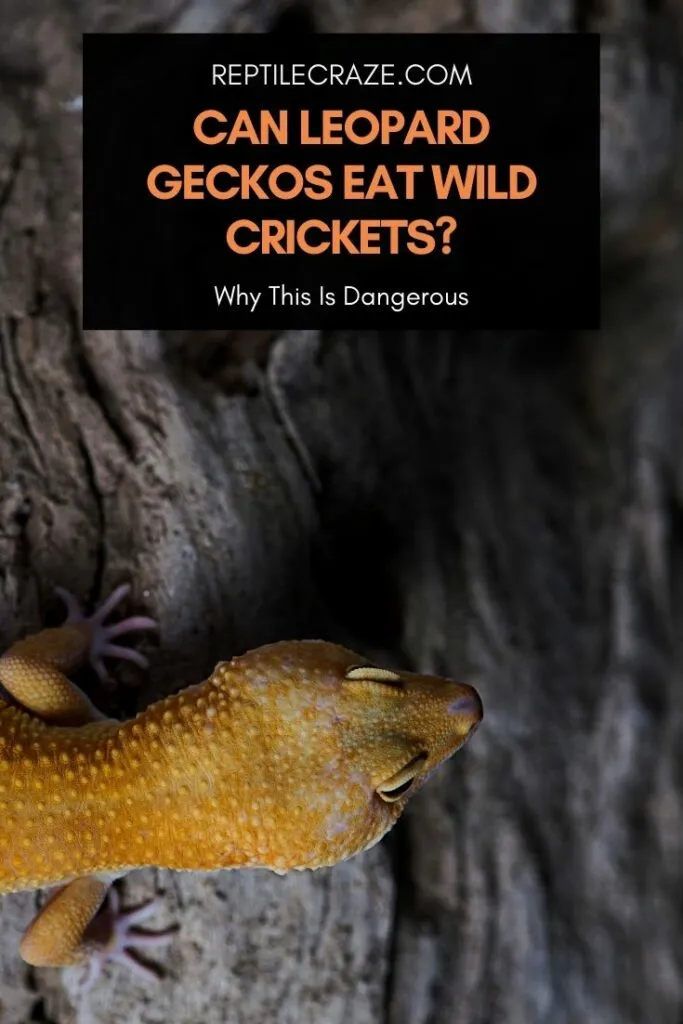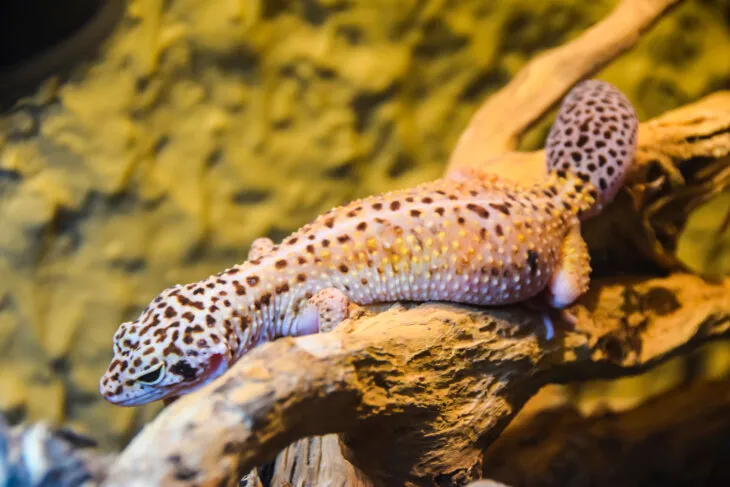
Crickets are probably the best possible
Wild crickets are nutritious for Leopard geckos but are also a source of bacteria, parasites, and pesticides. Ingesting them may cause a leopard gecko to become sick over time.
Let us show you in detail what feeding wild crickets can do to your leopard gecko. Some of it is pretty scary and can be dangerous for the reptile and the owner.
Table of Contents
Avoid Feeding Your Leopard Gecko with Wild Crickets
Often, people believe that crickets from outside are better than crickets fed with industrially produced ingredients.
In other words, some owners believe that it is a fresh and healthy option for their Geckos without added additives, preservatives, and artificial supplements.
However, exotic vets offer a few reasons why you should avoid feeding your Leopard Gecko with crickets from outside, but three are crucial.
Note: We highly recommend reading our guide on feeding leopard geckos crickets here as it shows you the best way to feed a leo.
1. It’s complicated to determine wild crickets’ nutritional value
The rule of thumb is to offer your Gecko
When buying crickets, you can always read their nutritional value on the label. That will keep you on track and help you plan healthy and nutritious meals for your Leo.
You can also check various cricket types’ nutritional value in the table offered by many reliable sources.
| Cricket type | Protein | Fat | Moisture |
| Brown house cricket | 19.8% | 4.4% | 70.7% |
| Banded cricket | 16.5% | 6.3% | 71.8% |
| Silent brown cricket | 16.4% | 9.3% | 68.8% |
| Black field cricket | 15.8% | 12% | 66.7% |
On the other hand, insects that live in nature come with too many unknown facts. You should be deep into the topic to find relevant information about their nutritional value in narrowly specialized literature.
2. Wild crickets carry bacteria and parasites
Most crickets living in nature are really a healthy and yummy meal for your Leopard Gecko. The problem is that our surrounding is heavily polluted nowadays.
Therefore, you can’t recognize healthy insects and quickly differentiate them from those in direct contact with bacteria and parasites. The most problematic bacteria they carry are Salmonella and Escherichia Coli.
However, a more significant concern is parasites. They naturally regulate wild crickets populations, so these insects often carry harmful microorganisms in their bodies.
One study shows that over 80% of wild crickets carry these pathogens, and almost 70% of identified parasites are harmful to insects only. Unfortunately, more than 35% are potentially pathogenic for animals, including lizards.
For now, scientists know very little about how microorganisms with pathogenic potential affect insects, including even commercially produced crickets.
Even though Horsehair (Gordian) worms are the most common internal parasites you can detect in crickets, they are entirely harmless to your Leo.
Unfortunately, it is not the case with others, and some parasites can severely jeopardize your pet’s health, including:
- Entamoeba
- Cryptosporidium
- Nematodes
- Tapeworms
Keep in mind that wild-caught insects are typically intermediate hosts for parasites on their way to your Gecko.
Your lizard can become infected either directly after ingesting crickets or indirectly through their feces. The only way to protect your Leo is to avoid feeding it with wild crickets.
The additional problem is that pet Leopard Geckos have been raised in captivity without exposure to most pathogens common in nature.
As a result, they are not immune to bacteria and parasites wild crickets bring from the outside.
When such pathogens invade a Leopard gecko’s body, its immune systems isn’t able to deal with them. In such a situation, you can expect microorganisms to cause numerous health issues, like:
- Loss of appetite (If your leo isn’t eating crickets, read our guide here)
- Diarrhea
- Regurgitation
- Reproductive failure
- Prolapse
- Neurological damage
The bad news is that there is one more danger. Parasites from crickets will spread through your Leo’s body and can threaten your own health after direct contact with a sick lizard.
Be aware that modern medicine still does not have adequate therapy for some diseases spread this way.

3. Crickets from outside are exposed to various chemicals
Crickets living outside are in contact with many harmful chemicals, including insecticides, pesticides, and herbicides.
Farmers often spray crops and lawns with these compounds to protect plants from pest invasion. Unfortunately, a part usually stays in food and affects living creatures passing by.
Additionally, there are too many compounds in the wild you can’t control in any way. So, your Leo can be indirectly exposed to numerous harmful chemicals through crickets coming from outside, such as:
- Artificial organic chemicals like PCB (Polychlorinated biphenyls)
- Synthetic insecticides like DDT (Dichloro Diphenyl Trichloroethane)
- Toxic chemicals like Dioxin
- Flame retardants
Unfortunately, these substances will end up in insects in two possible ways. They can sometimes stick to crickets’ bodies, but ingesting them with
Subsequently, your Leopard Gecko will eat all these pesticides indirectly while feeding on wild crickets. In most cases, the first health issues will occur very soon.
That is why catching and offering crickets from the outside to your Leo are not a good idea.
You should also avoid letting the pet lizard spend time outdoors with numerous possibilities to grab some wild insects on its own.
Summary
Theoretically, your Leopard Gecko can eat tasty and nutritionally valuable crickets from outside. However, it is not a recommended option in the modern world.
Even though they can’t physically endanger your Leo, most wild crickets carry various microorganisms and chemicals they have been exposed to. Such insects can cause digestive issues and are potentially lethal for lizards.
- Enchi Ball Python: A Unique and Stunning Morph of Python regius - March 27, 2025
- Emerald Tree Monitor: The Enigmatic Green Guardian of the Rainforest - March 26, 2025
- The Egyptian Cobra (Naja haje): A Fascinating Serpent - March 25, 2025
